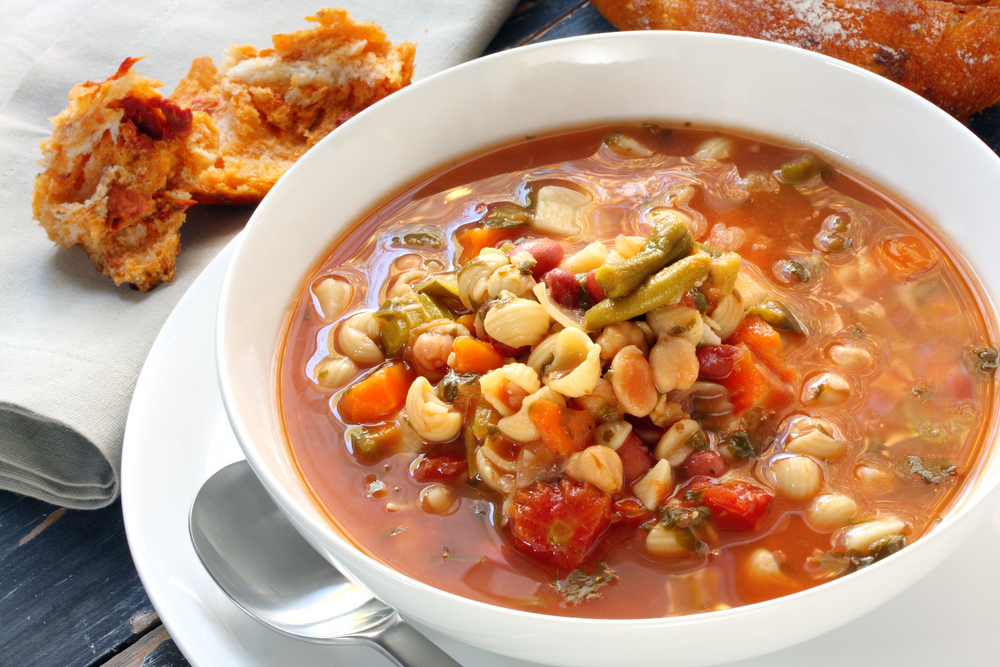Keeping your cup (and plate) full with Mediterranean style eating

In the current ‘food is thy medicine’ climate of nutrition and well-being, it’s easy to become fixated on what Americans are not doing right. Even the Academy of Nutrition Professionals of which I am a member of uses the website eatright.org, insinuating a right and wrong approach to eating. When coaching people to take steps toward improving their health, one can have a “glass is half full or half empty” approach. Focusing only on what people need to remove from their diet creates a half empty approach.
In this article, I want to focus on what Americans are doing. For example, we are seeing more whole grain products, a greater assortment of potatoes, fruits and vegetables in supermarkets and restaurants. Even fast food restaurants are offering items like grilled chicken sandwiches on whole grain buns, low fat chili, apple slices, and skin-on French fries. Schools are introducing locally grown produce into their lunch programs. Here in Spokane, we’re seeing a variety of ethnic (Mexican, Greek, Italian, Ethiopian) restaurants offering exotically flavored lentils and potatoes, tortillas, vegetables, and delicious salsas.
For each step toward variety, however, there is a new diet book such as Grain Brain or Wheat Belly telling us to avoid the evils of certain foods. The authors of these books are well-intentioned, but their approach is swift and extreme. No doubt, some people benefit from severe food restrictions, but in my 20+ year career as a nutritionist, I am constantly reminded of how little effort it takes for people to “get on track” with their eating to improve cholesterol, blood sugar, and/or weight. Usually, it’s unnecessary for most people to eliminate entire food groups like grain, fruits, and dairy to significantly improve their health.
Recently I was being filmed in KREM2’s news studio discussing the nutritional benefits of local crops. On that same day, a reporter from the Spokesman-Review newspaper called and asked if I was aware of the term orthorexia, which describes people becoming overly fixated on “clean eating.” There is no clear definition of “clean eating” but it is associated with consuming completely unprocessed foods, leaving no room for eating a slice of bread, enjoying a pancake feed fundraiser, or utilizing healthful fast food and sit down restaurants, never mind enjoying a scoop of ice cream on a sugar cone!
With severe diet books and clean eating making headlines, how does a person keep their cup half-full? In response, I encourage you to look toward the Mediterranean diet. The Mediterranean diet supports heart health, diabetes, and allows for a wide variety of Washington grown foods.
A recent (meta-analysis) study of 162,000 European and non-European people, over 5.5 years reviewed the effects of a Mediterranean-style diet on reducing diabetes with people already at high risk for heart disease. The study showed a reduced risk of diabetes by 27% compared to other eating approaches. The study participants emphasized the following foods:
- Whole grains, vegetables and fruits served at most meals. Fruits are eaten as desserts.
- Olive oil is the principal source of dietary fat used for baking and cooking
- Nuts, beans, legumes, and seeds are eaten for a good source of protein, healthy fats and fiber.
- Herbs and spices are used to season dishes, instead of salt.
- Fish and shellfish are eaten for protein and lean cuts of meats are eaten in small portions.
- Red wine is consumed in moderation
Americans like to work and play hard. We don’t tend to take siestas, nor do we slowly consume 7 course meals. We value our friends and family, and enjoy the convenience of utilizing fast foods, and firing up the barbecue. Sometimes, our lives can feel out of balance, and pointing the finger at food as the culprit is an easy target. We do need to remember to get out and move, to exercise our bodies, and not substitute food for any true nurturing that we may need. Keeping the cup half full is more than just eating the right food; it’s embracing a lifestyle of movement, love, and enjoyment. So enjoy your hamburger, and that slice of cake on your birthday. Let a juicy peach find its way to your mouth, and enjoy a baked potato, a serving of lean cut of beef, with colorful vegetables that keep your heart smiling.
